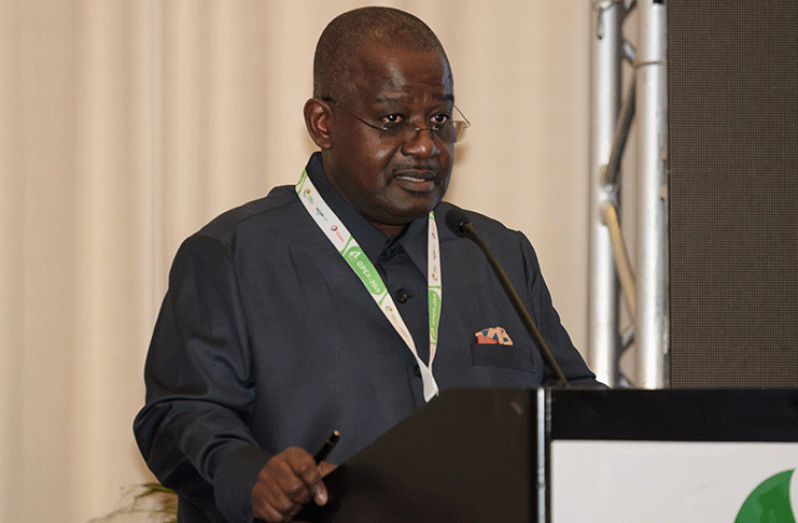…Ghanaian diplomat encourages Guyana
WHILE it is necessary for Guyana to accelerate its efforts towards putting the requisite laws in place to cater for its emerging oil and gas industry, the country need not buckle under pressure, Chief Executive Officer (CEO) of Africa Energy Consortium, Ghanaian Politician and Lawyer, Kwame Jantuah said.
The Ghanaian Diplomat, in an interview with Guyana Chronicle, said the country must plan carefully to ensure effective laws are in place.
He was among hundreds of petroleum experts who attended the Guyana International Petroleum Exhibition (GIPEX) 2019. During the conference, Jantuah presented a Ghanaian example of the evolution of local content.
Jantuah said that Ghana, much like Guyana, at the time of production, did not have all of its laws in place. He made the point while noting that the period of exploration and production for Guyana is a mere four years. In the case of Ghana, the country went from exploration to production within three years.
“The fact that you’ve just discovered means that the oil companies aren’t going to wait for you, they’ll definitely produce and it will take time for you to catch up with your law. It happened to us,” he said.
“It was an ongoing thing and, to date, we have all the laws in place. So, in as much as you’re going in to first oil, you shouldn’t be jittery that you don’t have your laws in place because it takes time to put the laws in place; it takes time to put efficient, effective laws in place,” the Ghanaian Diplomat explained.
Guyana’s existing legislative framework, including draft legislation, includes the Petroleum Act, Cap 92:01 (1930) which works to regulate the importation, sale and storage of petroleum; the Petroleum (Exploration and Production) Act, Cap 65:04 (1986) which deals with the regulation for prospecting of and Production of Petroleum and Licensing (PPL) and the Petroleum (Production) Act, Cap 65:05 (1939) which vests in the state the property in petroleum and natural gas within Guyana.
Several regulations were made under the legislation which include Petroleum Regulations (1930), the Petroleum (Exploration and Production) Regulations (1986) and Petroleum (Prospecting and Winning) Regulations (1967).
Ancillary legislation comprises of legislation relating to revenue, tax and customs; environmental protection; maritime and Occupational Safety and Health (OSH).
Recently, the Government passed the Natural Resource Fund Act, 12 of 2019 which establishes a fund to manage Guyana’s natural resource wealth while the Petroleum Commission Bill is within the Special Select Committee.
The Department of Energy (DoE) is also conscious of other factors which will assure Guyana’s success, such as the completion of the revised legislative framework for the sector; a new product-sharing contract template; completion of 2D & 3D seismic surveys; finalisation of its local content policy; completion of its Natural Resource Fund framework; completion of its National Oil Spill Contingency Plan and building capacity.
Jantuah opined that when it comes to public consultations to usher in these outstanding laws, plans and policies, it will take Guyana – with a population of under one million – a shorter time compared to Ghana’s experience with a population of over 30 million.
He also noted that Guyana, apart from laws specific to offshore production, will need to develop laws for onshore production as the country gets its footing in the industry.
“The one thing you should always remember is that oil and gas laws are dynamic, they’re not like any other laws that stay on the books for years. As the oil regime changes they change also,” the oil expert explained.
“The laws that you use for offshore are not the same laws that you use for onshore. Sometimes the laws that you use for ultra deep are not the same laws you use for deep and shallow waters — different mechanics, different installations, different types of companies…you need to be able to have laws that you can change as and when the industry changes,” he further explained.
While Guyana has not begun onshore oil and gas production, there is the belief that Guyana has much potential in this regard due to the fact that there have been several natural gas eruptions onshore over the years in residential areas. The Guyana Geology and Mines Commission (GGMC) and Civil Defence Commission (CDC) have been monitoring these eruptions.












